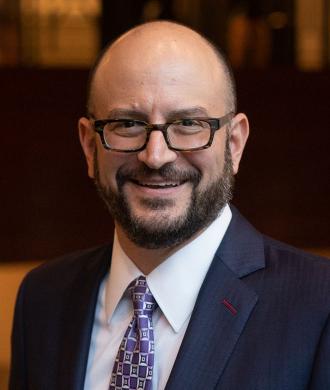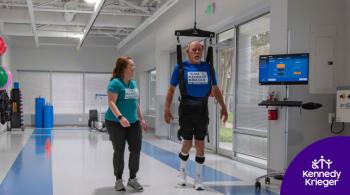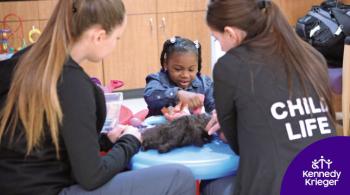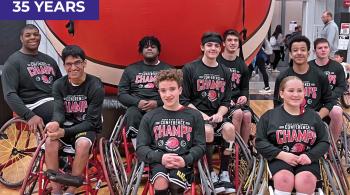Many people are unfamiliar with what a neuropsychologist does or why a child might need to see one. However, a child who is experiencing challenges or changes in thinking, problem solving, communication, attention, memory, emotional/behavioral functioning, especially when those issues might be affecting school performance, may benefit from an evaluation by a neuropsychologist. In this episode of “Your Child’s Brain”, Kennedy Krieger President and CEO Dr. Brad Schlaggar, talks to two of his colleagues at Kennedy Krieger who, as co-directors, comprise the shared leadership team of our Center for Neuropsychological and Psychological Assessment Outpatient Clinics at Kennedy Krieger. They are also joined by a parent who’s daughter has benefitted from a neuropsychological exam to give a parent’s perspective.
Resources
Learn More About Kennedy Krieger Faculty & Staff Members Featured in This Episode
Learn More About Kennedy Krieger Faculty & Staff Members Featured in This Episode
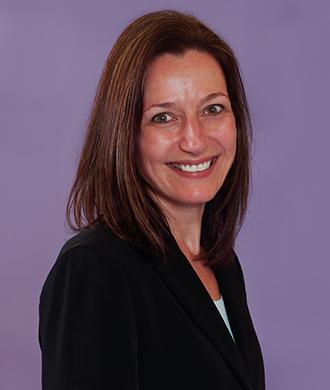
Cynthia F.
Salorio
,
PhD, ABPP
View Episode Transcription
Dr. Bradley Schlaggar (BS): Welcome to Your Child's brain, a podcast series produced by Kennedy Krieger Institute with assistance from WYPR. I'm Doctor Bradley Schlaggar, pediatric neurologist, and President and CEO of Kennedy Krieger Institute. As parents, it is inevitable that we will worry about our children. But when your child learns, thinks, communicates differently or atypically, that worry can be accentuated as we try to understand whether those differences constitute a problem that may need to be addressed to help assure that child's success academically, but also socially, vocationally in the community, and really in any aspect of life. A child who is experiencing challenges or changes in thinking, problem solving, communication, attention, memory, emotional and behavioral functioning, especially when affecting school performance may benefit from an evaluation by a neuropsychologist. Neuropsychology, which is a specialized branch of psychology, uses principles of the brain's structure and function to understand an individual patient's cognition, language, behavior, and functioning. To evaluate patients, neuropsychologists use information from the patient's history and clinical observation, along with standardized assessment tools to characterize and quantify what is happening with the patient, often in the context of other clinical problems that involve the brain, such as epilepsy, traumatic brain injury, stroke, and others. Pediatric neuropsychologists take into account our ever deepening knowledge of the development of brain structure and function to understand why a child is having challenges in school, at home, or other settings. Using a neuroscientific context, they assess academic skills and provide an incisive examination of the cognitive skills necessary to perform well in school and outside of school, skills, again, like memory, attention, language, executive function, problem solving, and others. Understanding a child's specific strengths and weaknesses across these different domains helps to better focus school plans and medical treatment, as well as to anticipate areas of potential future difficulties. Neuropsychological evaluations can be extremely informative and helpful in the creation and updating of an individualized education program or IEP for children who qualify for them. In this episode of Your Child's Brain, we're going to talk about neuropsychology, psychology, and the role that both neuropsychologists and psychologists play in evaluating and identifying cognitive disorders and recommendations for a child's school, and home environment. I'm joined today by two of my exceptional colleagues at Kennedy Krieger, who, as co-directors, comprise the shared leadership team of our Center for Neuropsychological and Psychological Assessment Outpatient Clinics at Kennedy Krieger. They are doctor Alison Pritchard, a board certified child and adolescent clinical psychologist, who is also an associate professor of psychiatry and Behavioral Sciences at the Johns Hopkins University School of Medicine, and Doctor Cynthia Salorio, a board certified neuropsychologist. She's also professor of Physical Medicine and Rehabilitation and of Psychiatry and Behavioral Sciences at Johns Hopkins. We're also joined by Michelle mother of Aria. Welcome Alison, Cindy, and Michelle. Cindy, I'll start with you in those initial comments. I broadly introduced neuropsychology. Is there anything else that you'd like to add?
Dr. Cynthia Salorio (CS): Not really, Brad. I thought that was a brilliant description of neuropsychology. I will say that a lot of people think it's this magical, comprehensive, amazing evaluation that's a right fit for any question. One of the things I want to stress is that not all testing is neuropsychology and not all neuropsychology involves testing. We do a lot within our program that is not neuropsychology, but I thought that description was excellent.
BS: Well, thank you for that. How do neuropsychology and psychology differ, and how are they used together for a child who comes to attention due to potential concerns?
CS: I think the key about neuropsychology is that it's really a sub-specialty of psychology. All of our clinicians have a doctoral degree in psychology and extensive training in mood, behavior, and cognition, just like you mentioned. Our neuropsychologists actually have additional specialty training in neural systems, neural anatomy, and neurological conditions. In a child with epilepsy, for example, as you mentioned, you'd want a neuropsychological evaluation to really look at all of the interplay of all of those things. For a child without a medical complexity or a neurological condition, you may not need a neuropsychological evaluation. In fact, schools can also do testing that will answer a lot of the questions that families have before they even get to us in our program.
BS: You mentioned epilepsy, what other concerns would cause a clinician to recommend a neuropsychology evaluation? That's a clinical diagnosis. Are there other problems that would surface that would lead specifically to a neuropsychology evaluation? Then what might that evaluation show?
CS: Sure. A lot of our referrals are the same, whether it's for neuropsychology or psychology assessment. Usually, that is the child's having trouble in school. They've had cognitive changes. They have attention concerns, or there's concerns in a specific cognitive or developmental domain. The reason we would route to a neuropsychological evaluation would be if those concerns are in the context of something like epilepsy or cancer or brain injury or stroke to really differentiate whether it's the underlying condition, the effects of that condition, so seizures, for example, the medications or other treatment for that condition, or something comorbid like a diagnosis of ADHD, which actually is found very co-morbidly with a lot of the neurological conditions. In contrast, we would route to a psychological evaluation if there isn't that medical complexity overlay, but the question is really differential diagnosis and why a child is struggling in school.
BS: Alison, picking up on the different types of concerns that might lead to a psychological evaluation. I pick up on Cindy's point, but also what results or findings might such an evaluation show?
Dr. Alison Pritchard (AP): Cindy did a wonderful job of very clearly explaining a complicated decision tree there. For a psychological evaluation, we are often seeing kids whose parents have concerns about symptoms. Something isn't going right, but they're not sure why. Many times, some of the most common concerns that we see are symptoms like anxiety and depression, attention problems, like Cindy said, trouble in school, trouble with friends, things like that. What we're trying to do in a psychological evaluation typically is understand where those problems are coming from, put a name to them if we can, and then make recommendations for how to best support the child. That might include different treatments. Sometimes we might recommend medication treatment, sometimes we might recommend behavioral treatment, but also other supports, so accommodations or things that families or schools can do to really level the playing field for that child.
BS: Cindy, after an evaluation, what happens once the test results are in? What does that even mean getting the test results in? What does that look like, and then what are the implications for those test results for school, for at home, and elsewhere?
CS: That's the most important part. After we do the evaluation, what we do is compare a child to other children that child's age, but more importantly, we compare a child to themselves. When we look at all those domains of functioning, what are our child's strengths? What are our child's weaknesses, and how does that play out day to day? The most important part of the evaluation is the recommendations. Getting back in touch with families, or sometimes we can do it the same day, but usually it's a week or so later, and really laying out what this means for the child and what it means across various settings, and we can make very specific recommendations based on that child's weaknesses compared to other children or compared to that child themselves.
BS: I think this would be a good time to bring in to our discussion, Michelle, for a parent perspective. Welcome again, Michelle. Thank you for joining us. Can you tell us a bit about Aria?
Michelle (M): Aria is currently 11-years-old, almost 11.5. She's in sixth grade. She's sweet, empathetic, funny, smart child. She loves her pets and her family. She loves art and all creative things and doodling, which is a blessing and a curse with ADHD for her. She loves math. She loves trying new foods. She's a fun kid.
BS: What concerns did you have for Aria? When did they begin, and how did you find your way to seeking neuropsychological evaluation for her?
M: Early on, and she had some what seemed to be like anxiety. But when it really appeared was in the early days of the pandemic. I have distinct memories of sitting outside of her room where she was on a laptop in virtual school. I was on my own laptop working, and I could see how much she was struggling to pay attention to second grade online. She was doodling and making tiny versions of everyday objects and not focusing on what the teacher was saying. Well, to me, anyway, it seemed just beyond the struggles I think we were all facing of virtual work and virtual school. That led us to her pediatrician and to her counselor to talk more about what might be going on there. It was really just her focus or lack of focus, but then also being able to hyper focus on things. Avoiding certain things that she's very capable of doing, but just didn't want to do. Forgetting things, her big feelings about doing homework. Once we were back in regular school, and she was at school and then would come home, those big feelings about doing math, which she loves, but really did not want to be doing. Struggled with spelling that also seemed beyond what is typical for her age, and then was confirmed by her teachers. Then anxiety that we could see happening. Sometimes we could see reasons why, but other times, neither she nor we could figure out what was driving her anxiety. It was actually, we went to the school to work out what ended up being a 504 plan to get some supports in place for her. The school psychologist said, it wouldn't be bad to also get even further evaluation and just see if we can learn a little bit more about the specific things that her ADHD affects and how we can support her better. That's how I ended up at Kennedy Krieger.
BS: Do you recall what specific steps were recommended that came out of that evaluation that guided the approach that you took?
M: My work and her work with Kennedy Krieger just recently happened actually. Aria is now in middle school, which was a series of transitions and a lot of different things going on that we also learned about. Things she's good at, things that she was struggling with even more. I think the evaluation with Kennedy Krieger came at such a great time because we had insight into more. Aria had insight into more that she needed help with. From that evaluation, we adjusted and updated her 504 plan to include more things, like preferential seating, which seems obvious, but to have it said that maybe she needs to sit in the back, maybe she needs to sit on the side, because that's where the teacher typically stands rather than just automatically assuming the front of the classroom. Other things were redirection to the work at hand. If a teacher notices her doodling, maybe having a non-verbal cue that could just redirect her and get her attention back on what she needs to be doing. Breaking down her assignments into chunks because that can get overwhelming. Particularly for Aria writing assignments, she needs really help seeing the big picture, but also understanding that it's a bunch of little things together. For Aria, also, since she struggles with spelling, Dr. Pritchard's team recommended keyboarding support. If she's not being tested on spelling, but needs to answer in a written format, being able to type that and have spell check there and a little bit of grammar help, and just ease her anxiety about the writing, the actual physical writing piece and her having to spell on her own, I guess. There were so many really valuable things that came out of it that we were able to bring to the table in an updated 504 meeting for her.
BS: Just reinforcing what the point made earlier by Cindy, I think that the recommendation list is long and crystal clear. That's one of the great deliverables of this report. It makes it possible, I think to translate to actionable steps at school, but also perhaps at home. I'm wondering what effect that these recommendations had for how Aria is doing at home.
M: Thank you for asking that. That was really important, I think, for my husband and I with Aria. We didn't anticipate getting validation and support for us at the same time. Dr. Pritchard and team helped us understand that the struggles that Aria had at home and how much time we were putting into helping her. Even just like settling her down, but also following up the teachers and all of that was beyond what is typical. It's okay to try and address what's at home also. Her teachers and the school staff are quick to say that her grades are all great and her standardized testing is great. But with Dr. Pritchard's help and greater understanding on our part to say, yes, she's able to perform when needed, but not without consequences. We saw a lot of those consequences at home. A lot of anxiety and just upset and crying and struggling to get through things. One of the recommendations was potentially an executive function coach, and so we did take that up right away. That's been a huge help for us. It's somebody that meets with Aria weekly and goes through her planner and her grades and looks at what's missing assignments that aren't there, talks about how to remember things better. But it's also helped my husband and I just feel like we have another set of eyes and another support to help us parent better and maybe even be more parents than trying to get all of her schoolwork done. That's been really great too. Just at home to have less anxiety on all of our parts, I think.
BS: How is Aria doing now?
M: She's doing well overall. This 504 update was recent, and so these adjustments to that plan are recent. I think teachers are adjusting, Aria is adjusting, we're adjusting. None of this stuff happens overnight. It's definitely a process, and we're all always learning. I would say overall, she's doing well, and I think we're all optimistic that we've learned a lot. It sounds weird, but we know how to learn better going forward even. We just know certain things to look out for, and we know we have a good team at her school that we can reach out to and update. Overall, good, and I think a lot to be continued.
BS: Wonderful. Thank you again, Michelle. Alison, I want to pick up on a couple of points that Michelle made. First, I think we should just make sure everybody is on the same page. Can you just define what a 504 plan is?
AP: A 504 plan is a document that follows a child through school and into life, really, that identifies a specific disabling condition. Then what accommodations and supports need to be put in place to help level the playing field for that child because of the condition. That's where things like preferential seating, extended time, more frequent breaks, those common accommodations that we see for kids with ADHD are often found. The real value of the 504 plan is that, like I was saying, it follows the child through their schooling. You may have a fantastic sixth grade teacher who really gets your kid, and naturally puts all of the supports that they need in place. But then when you go to seventh grade, they're with a different teacher. That seventh grade teacher needs to know, okay, these are the things that I should be doing to help support this child.
BS: Thank you. Another point that was raised, as Michelle was describing, Aria is that they will say, that she was getting good grades and did well on standardized tests. Sometimes there's this, I guess, misapprehension that in order for ADHD to be clinically problematic, it must be showing up in these other ways. Can you address that discrepancy?
AP: That's absolutely an issue. Especially, there are a number of kids who are quite bright and who may have very significant ADHD, and so may be able to get through, especially the early school years, even though they're not paying attention very well, because they don't need as much repetition, maybe as some other kids in order to solidify a concept. Unfortunately, for most people, at some stage in their education, they reach a point where they can't just like, brute force brain power through it and they need to have the study skills, and they need to have the organization and planning capabilities in order to be able to do well. For many kids, they do eventually reach a point where academically they may start to struggle somewhat. For some folks, it's not till graduate school, though. But the other concerns that we often see for kids with ADHD are that there is conflict going on in the family. Like Michelle was saying, when you have to be the parent and the teacher, and you have to stay on top of your child for them to get their work done that can really cause a lot of friction in the family, and make it harder for you to do the basic parenting that you need to do. In addition to some of the academic difficulties that kids with ADHD can face, there can be some conflict within the family, because as Michelle was saying, it's really hard to be both the parent and the coach. In addition, kids with ADHD tend to receive a fair amount of negative feedback. They are hearing from their teachers, from their parents, and from their friends that they're not doing things quite right, and so that can all culminate in some self-esteem problems, eventually, you start feeling badly about yourself and then ultimately for some children, even move into more significant concerns with anxiety and depression.
BS: Alison, you made the point a moment ago that really every student at some point, might max out on what their brute force intelligence and can give them where the executive functioning demands might saturate. What's the argument for why every child might not benefit from such an evaluation?
AP: There isn't a good argument for that, so no. I think that really in a perfect world, every child would have a comprehensive evaluation so that they and their family and their teachers could understand everything about their learning strengths and weaknesses, their emotional strengths and weaknesses, all of that. The problem is supply and demand on the one hand and cost on the other hand. The need for psychological and neuropsychological evaluations far exceeds the number of people we have trained to do these things and so unfortunately, that leads to really long wait lists for evaluations, which is not optimal for developing children. But the other problem is cost and I think often insurance companies will argue that certain aspects of a child's functioning are really more school related and so are things that schools need to be assessing and managing. Many schools do do that. Many kids do get evaluated through their schools in cases where children are doing well in school to begin with, but are maybe having other difficulties. Schools often say, but they're doing fine in school. Why should we evaluate them? Some kids do end up finding themselves in a little bit of an in between with insurance and schools and trying to figure out how to pay for an evaluation that's not getting covered otherwise, and that's costing upwards of $3,000, usually.
BS: Excellent points. We live in a resource limited world and maybe for another episode, we could talk about how to address that. From a Kennedy Krieger perspective, we understand that healthcare and education, they're all interrelated, impossible to separate out. But in the real world, outside of our walls, there is a necessary separation that happens and so this is the work in front of us is to find ways to make it possible for every child to have enough information about them to optimize their outcomes. That's what we strive for. Cindy, let's talk about the testing environment itself. What ages makes it possible for you to test children? Does it start as early as language beginning? How do you approach that?
CS: Sure. I will say our most common referrals are for school age children, but we actually can do testing in infancy and we also see adults, particularly, if it's a condition that manifested in childhood or a developmental condition or a child that we've been following for a long time. We will test children throughout the whole age range. But most of our referrals are for school age children.
BS: Operationally, who performs the tests and does the interpretation of the results?
CS: Our licensed psychologist and credential providers are the ones who do the interpretation and oversee the entire process. Sometimes, we'll do the test administration and scoring ourselves. We also have very qualified psychology associates who have credentialing just for testing. That's what they do day in and day out. They, actually, do a better job than sometimes our older providers. I'm talking about myself. Maybe can do, especially with newer evaluation tools. We're also a training facility, so sometimes we have trainees who are in various stages of getting their doctoral degrees, who might do some of the testing and even take a stab at interpretation. But ultimately, it's the licensed and credential provider who oversees it and who is responsible for that interpretation of the test results.
BS: Alison, are the tests sort of validated universally or are accommodations made for cultural or linguistic or ethnic differences or backgrounds?
AP: This could be a topic for a whole other podcast as well. The tests that we do are standardized meaning that they're given in the same way every time to every child more or less. The value in that is that it allows us to compare my patient's performance to the performance of lots of other kids their age and say where they're functioning relative to other students. The disadvantage of that is that they're given the same way regardless of the characteristics of the patient. It makes it challenging, and there is quite a lot of research now to suggest that the tests that we use don't perform the same way in all different patient populations across all different cultures and backgrounds, and family contexts, etc. Which is where the non testing part of what we do comes into it, so the value of the clinical interview is just can't be overstated because that's where we as psychologists get to really try to understand the context that the patient is being raised in and growing up in, and then we can apply that contextual lens to what we see on their performance on the standardized tests, and make sense of the big picture that way.
BS: Cindy, along those lines, there'll be patients who have primary communication issues that might be part of the reason they're being evaluated. How is testing implemented for children that have communication challenges?
CS: We have a whole huge toolkit and lots of tools within that to measure all the different constructs that we're interested in. Some of our tests, actually, are completely non-verbal. Even the examiner is gesturing and providing demonstration of what we want the child to do without talking, and the child can respond in various ways. If they have communication challenges with language, we can choose tests that are very language minimal. Unless the specific thing we're assessing is how they use language. If the child has difficulty with pointing, for example, or pretty significant motor impairments, we can choose tests that allow for eye gaze or for different ways to communicate their choices. We have a lot of ways that we can use test selection and also modification of our tests to get at those different things. Again, like Alison said, the clinical interview and the clinical observations that we make in working with the child are critical in that interpretation.
BS: Alison, I'd like to get into the topic of learning disorders. What is the definition of a learning disorder, and how does testing reveal whether a child has one?
AP: Learning disorders are what we see when kids are struggling specifically in reading, writing, or math. We call those specific learning disabilities. They also go by lots of other names, dyslexia, dysgraphia, etc. The definition of a learning disorder is when a child's performance in one of those academic areas falls below what is expected by their grade level, and we know that they've received appropriate instruction. If you are in third grade and are having trouble with single word reading, that's probably not appropriate for your grade level and we might consider whether you have a learning disability. Testing can give you information about exactly where the child is relative to others at the same grade level in terms of their academic skills, and can help tell you a little bit more specifically about which particular aspects of an academic skill a child is struggling with. For reading specifically, is it that they're having trouble with the phonics aspect of reading, are they having trouble reading fluently or are they having trouble understanding what they've read. Those are all different permutations of a learning disability.
BS: We spoke, earlier, about attention deficit, hyperactivity disorder, ADHD. Can you comment what is that and then, is it a form of learning disorder or is it a different clinical issue?
AP: ADHD falls under the same diagnostic umbrella as learning disorders, in that it's a neurodevelopmental disability. Neuro developmental disabilities include ADHD, learning disorders, intellectual disability, autism, speech language difficulties. These are all conditions that tend to arise during childhood and often persist. ADHD is not the same as a learning disability, but it is under the same broad umbrella.
BS: Our learning disorders or disabilities, I think we're using these interchangeably. My understanding is sometimes that the disorder is more of the clinical diagnosis, disability might be academic or like a legal structure?
AP: Yes.
BS: But we're using them interchangeably because, frankly, we use them interchangeably. Are learning disorders treatable?
AP: They are. Neurodevelopmental disabilities broadly tend to be fairly treatable. Learning disorders specifically, we do have some really nice treatments for learning disorders, and it's especially well developed with regard to reading in particular. We have nice evidence supported treatments for learning disorders. But we also accommodate kids with learning difficulties. Usually, the management or the support of a child with a learning disorder will involve both treatment and accommodation. You might, for a young child, really do some heavy duty, intensive phonics intervention with multi modal instruction, and really try to improve that child's phonic skills, and they might become a very good reader. There are some kids for whom these interventions work very well and essentially fix the problem. For other kids, they don't work as well. For kids for whom the interventions may not work as well, we do more accommodating. Meaning, let's say you have a fifth grader who's really struggling with word reading. But now they've moved on into a classroom situation where they have to read essays for their social studies project. We would often recommend in that case an accommodation like text to speech, where the child's able to not have to read the essays, they can listen to the essays. The purpose of that accommodation is to allow them to access the content of the information. Which is the point of the exercise without the reading demands. Now, if that child were taking a reading test specifically, of course, we wouldn't recommend having a text to speech accommodation. But for other kinds of tasks, where the point is really for them to get at the content, that would be a nice accommodation for them to have.
BS: Alison, if a child has executive function issue well we should define what that is, but how does that relate to ADHD? Executive function and then the relationship to ADHD?
AP: Yes. Executive functions are the brain's air traffic control system. It's what gets you through your day to day life. It involves the ability to plan things, the ability to organize yourself and your surroundings, the ability to not respond impulsively to things when it would get you in trouble. There are lots of aspects to executive functions. What we often see as being problematic for executive functions among young children are things like constantly interrupting and blurting out answers or never being able to find their lunch box. I had one patient whose parents called him Johnny Lost and Found because every blessed day they were at the school Lost and Found trying to find his items. The executive functioning demands really ramp up in middle school, usually. The kids at that stage tend to show difficulty with knowing exactly what homework is assigned, remembering to bring all the necessary things home to complete their homework and then remembering to turn in completed homework. They've done the work, but now they're getting marked off because they can't remember to turn it in. Kids with ADHD often struggle with executive functions, but so do kids with lots of other neurodevelopmental disabilities and with some medical conditions. Executive function deficits are certainly pretty characteristic of ADHD. But are really common across a wide variety of conditions.
BS: Michelle mentioned that Aria got a executive function coach. Talk about identifying that as a resource, and maybe we could even include on the page associated with this episode, information about getting a executive function coach. But what does that person do? Is it a psychologist? Is it somebody who specifically trained in executive function?
AP: Most often executive coaches or any cognitive rehabilitation intervention is not covered by insurance. Often families have to pay out of pocket for that type of service. As Alison mentioned, lots of kids struggle with executive functioning. It's a core resource that we wish we could get covered for lots of kids. But an executive function coach can be lots of different types of therapist. Sometimes speech language pathologists do it, sometimes it's a psychologist. Sometimes it's a master's level social worker. They serve as your higher level brain function. They help you organize, plan big projects ahead of time. Like Michelle mentioned, check your planner and say, you have this assignment that's due in three weeks. Let's break it down and really figure out how you're going to meet that deadline. They act as your executive functions for you. In doing so, train you and your brain to do those things more automatically.
BS: Cynthia, I'm going to end with you with this last question. I think listeners, parents, especially will want to know. What's the first step a parent should take if they have concerns.
CS: Michelle actually mentioned it and she did everything right. She said, I had concerns about attention and anxiety, so I went to my PCP. Then I had concerns that this was affecting school and I went to the school. I would say your first step with any concerns is to go to your PCP. You can get in relatively soon, and if it's a reasonably straight forward question or problem, that person can recommend intervention or next steps right away. I would also recommend if it's a learning concern or a concern about school performance. That parents go and request in writing an evaluation or a meeting with the school team. It's really only when those things don't work or when it's such a complex question that you need to come somewhere like Kennedy Krieger to get these more comprehensive evaluations.
BS: I mentioned before that we could put resources up on the page. If there are other resources that you think would be valuable links. We can do that as well. I think this is a really great place to end our discussion. I want to thank our guest, doctors Alison Pritchard and Cynthia Salorio, and to Michelle for providing a parent's perspective. We hope that you, our listeners, have found this discussion about neuropsychology and psychology, both interesting and informative. Please check out our entire library of topics on your child's brain at WYPR.org, KennedyKrieger.org/ YCB or wherever you get your podcasts. You've been listening to Your Child's Brain. Your Child's brain is produced by Kennedy Krieger Institute with assistance from WPR and producer Spencer Bryant. Please join us next time as we examine the mysteries of your child's brain.

